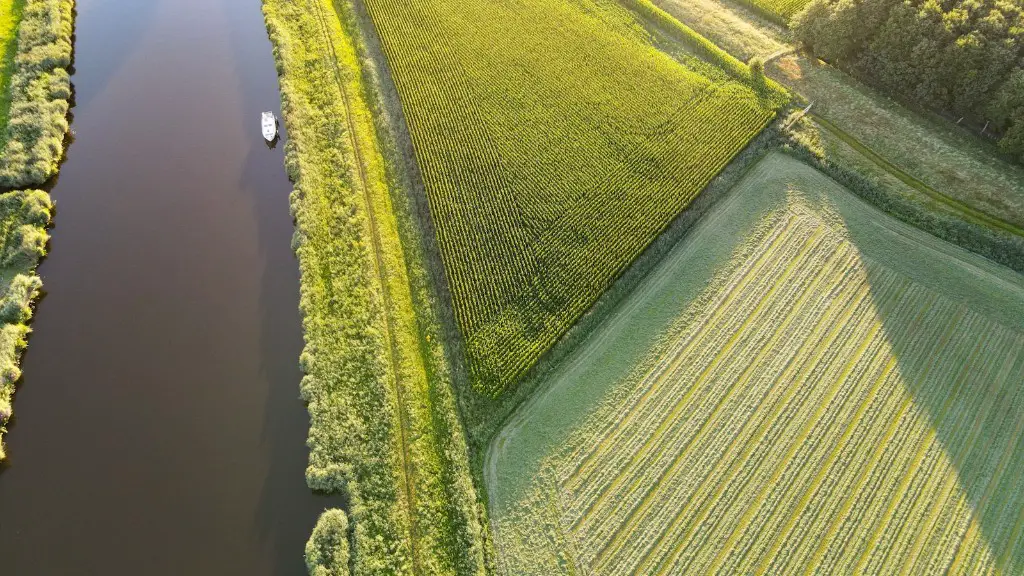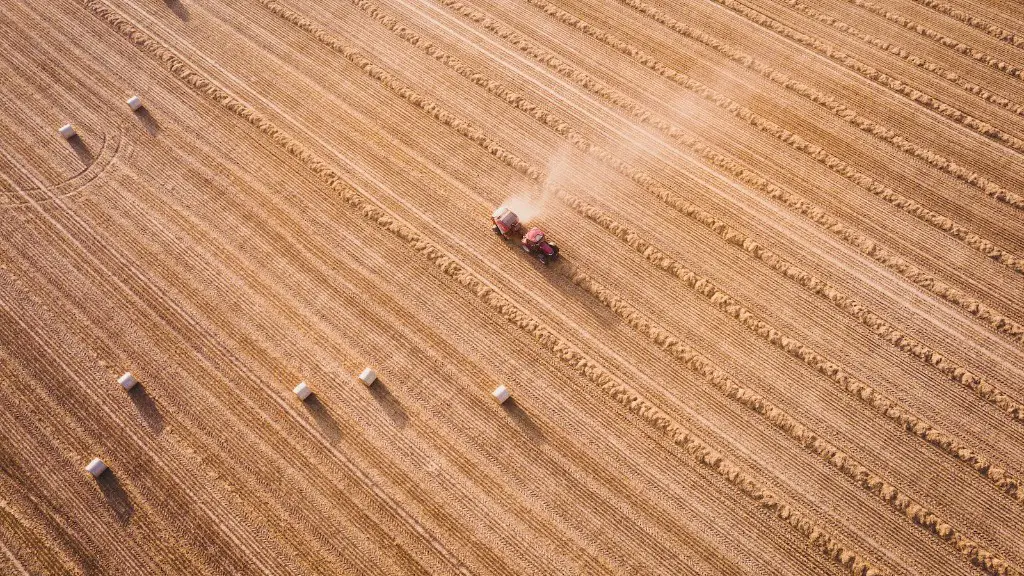Humans have been practicing agriculture since the Neolithic era, around 10,000 years ago. This revolutionary new way of providing reliable food sources sparked the development of many other aspects of societal structure, including labor specialization. As people moved away from hunting and gathering and into a more sedentary lifestyle, they were able to expand their subsistence farms to allow for more specialized work roles to appear. As a result of agriculture, people could now expand beyond food production to other tasks such as pottery and tool making, allowing for a greater division of labor.
Agriculture allowed for greater stability in the food supply, which in turn allowed populations to grow. As the population grew, labor specialization became even more evident, with workers focusing on different crafts such as hewing of wood, smithing or spinning of yarns. As the population increased, labor specialization grew even further in complexity, and with it a greater level of crafts and goods produced. Public works became more commonplace, as towns provided communal spaces to farm, met with their neighbors, and even hold court.
This gradual specialization resulted in humans creating more advanced productive capabilities and technologies, leading to the expansion of agricultural production. Labor specialization was also fundamental to the transition from exchange of goods to money-based economies. As various goods became available for purchase from different makers, money became the standard unit of exchange and led to the creation of markets. By specializing in a particular craft, craftspeople were able to produce a higher quantity of goods in less time and make more money from their goods.
Agriculture also enabled the development of written language and led to the creation of numerous sources of social knowledge, including the passing of skills from one generation to the next. This allowed for the further development of labor specialization over time, as people used their knowledge to create new goods and services. Eventually, this led to the emergence of more complex societies in which households were organized around labor specialization and individuals had specific roles within the family unit.
Classes of society also emerged due to the assignment of certain occupational roles related to different labor-specialized activities. On a much larger scale, the emergence of kingdoms, cities, and nations were due to the increasing complexity of labor roles, leading to the rise of social hierarchies and the division of labor between different classes. As a result, agriculture-based labor specialization has become an integral part of human society, shaping how and why people work in both industrialized and developing countries.
The Role of Technology in Labor Specialization
Technology has long been an important factor in the development of labor specialization. For example, simple tools such as axes and hoes allowed for improved crop production, leading to the emergence of agrarian societies. As technology became more advanced, manual labor was partially or wholly replaced by machines, leading to an increase in the efficiency and accuracy of labor tasks. As the pace of innovation increased, people began to specialize in certain areas of computer programming, creating a whole new set of labor-related roles.
In recent years, the introduction of artificial intelligence and machine learning has caused a significant shift in the labor market. As machines are increasingly taking over certain tasks, more people are becoming limited to certain niche roles within the workplace. For example, software developers and data scientists are responsible for creating algorithms and writing code that enable machines to take over labor-intensive tasks such as customer service, finance, and accounting. This shift towards a more specialized labor force has continued to accelerate with the introduction of the Fourth Industrial Revolution.
Another factor that has enabled labor specialization is the rise of globalization. As countries become increasingly interconnected through both trade and immigration policies, labor specialization across different materials and professions is made possible. The emergence of a globalized labor market has enabled people to specialize in areas that may not be available in their own countries, leading to further economic growth.
The Impact of Labor Specialization
The emergence of labor specialization has had a significant impact on our society, enabling a more efficient and productive use of resources. By allocating certain roles to specific individuals, labor specialization has increased the overall productivity of workers and, as a result, raised the standard of living in many areas of the world. Additionally, labor specialization has led to an improved quality of life as workers can concentrate on specific tasks instead of having to take on multiple roles. This, in turn, leads to fewer errors and improved safety in the workplace.
The development of labor specialization has also enabled countries to focus more on innovation and upgrading existing services, leading to further advancements in skills and productivity. The emergence of more specialized roles has also allowed for certain groups of people to establish themselves as experts in their respective fields, which helps to attract new investments and resources to a particular location. As a result, technological and economic progress has been seen in many different countries across the world.
Labor specialization has also had implications for the way that people organize themselves in the workforce. As people become more specialized in their work roles, the combination of different roles leads to the creation of teams, thus allowing for increased collaboration and creativity. Additionally, specialized roles enable for the development of social networks which are beneficial for connecting people and providing information about specific industry topics.
Implications for the Future
As labor specialization continues to advance, it is expected that the demand for more complex and specialized labor roles will grow even further in the near future. With the rise of automation and the continued emergence of the Fourth Industrial Revolution, the existing labor force is likely to change, with many jobs becoming obsolete due to new technologies. It is important that people learn to adapt to these changes in order to remain competitive in the labor market.
In addition, the rise of new technologies is likely to increase the need for more specialized roles. For example, with the emergence of robotics, people with a more technical background may be needed to control and configure the robots and to build the algorithms needed to successfully run them. Similarly, the increasing prevalence of technology and the Internet of Things may create a need for highly skilled software developers and microchip integrators.
Overall, technology has catalyzed labor specialization on a global scale and its prevalence is expected to continue to rise in the future. As labor roles become increasingly specialized, it is essential that people collaborate and learn new skills in order to stay competitive and remain relevant in a rapidly changing labor market.
The Impact on Education
Education has also been impacted by the emergence of labor specialization. As the types of labor roles become increasingly complex and specialized, there is a great demand for people with a higher level of education and technical expertise. As a result, education systems have been forced to adapt to the changing labor market and offer courses geared towards preparing students for such roles. The availability of technical courses and certifications is becoming increasingly popular as people look for ways to gain the necessary skills and knowledge needed for a successful career.
In addition, the emergence of labor specialization has led to the increased importance of higher education. As more and more specialized roles require a college degree, there is an increased pressure on young people to pursue higher studies in order to be eligible for those roles. This has resulted in a significant shift in the way the educational system has been structured, with university degrees now being a must-have in order to be competitive in the labor market.
The emergence of labor specialization has also created new opportunities for certain groups of people in terms of access to education. For example, many online courses and certifications have opened up new avenues of access to higher education as they are less costly and open to anyone with an Internet connection. In addition, the emergence of specialized labor roles has increased the need for retraining and on-the-job education, allowing for people to gain the skills needed to actually do the job.
Conclusion
Agriculture has been a key factor in the emergence of labor specialization. By providing a more reliable food supply, people could move away from an itinerant lifestyle and instead focus on more specialized work. This gradual division of labor has had far-reaching implications on our society, leading to increased productivity and overall improvements in the quality of life. Technology has also been an important factor in labor specialization, with advances in automation, robotics and artificial intelligence changing the labor market significantly. As labor roles become more specialized, it becomes increasingly important for people to stay up to date with current technologies and skills. Overall, the emergence of labor specialization has had both positive and negative implications but is here to stay as we move into the future.




